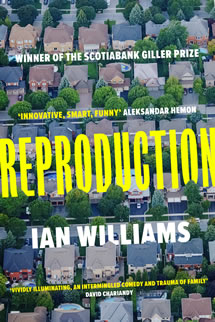Reviewed by Robert Goodman.
By Ian Williams, Hachette, $32.99.
 Canadian poet Ian Williams’ debut novel Reproduction has genetics built into its structure. The book explores various facets and permutations of human connection. It complicates what might otherwise be the simple question of “where did I come from” by placing that question in the context of the multicultural Canadian experience. And it does so with a structure that tries to mimic biological structures and processes.
Canadian poet Ian Williams’ debut novel Reproduction has genetics built into its structure. The book explores various facets and permutations of human connection. It complicates what might otherwise be the simple question of “where did I come from” by placing that question in the context of the multicultural Canadian experience. And it does so with a structure that tries to mimic biological structures and processes.
The book starts in the 1970s and explores the unlikely relationship between Edgar, a middle aged German businessman, and Felicia, a nineteen year old Caribbean student. This would be a meet cute if it wasn’t in a room in the palliative care ward of a flooded hospital where both of their mothers are dying. Only Edgar’s mother doesn’t die and Felicia ends up caring for her and in a quasi-abusive relationship with Edgar which leaves her pregnant. The next section of the book jumps forward to the 1990s and finds Felicia and her teenage son Armistice (Army) renting the basement/garage of Oliver who has a sixteen-year-old daughter Heather. Things become more complicated in the next section of the book which jumps around the lives of its main characters. And then the final section comes full circle as Edgar, suffering from cancer, comes fully back into Felicia’s life.
Williams uses all of these stories to explore the changing nature of families and relationships over the last forty years. Edgar and Felicia’s relationship starts randomly and bumps along in the background while new connections are formed, coming out of another random event – Felicia renting a room from Oliver. These relationships become more intertwined as events create a larger informal family that includes Edgar, Felicia, Army, Oliver, Heather and later Heather’s son Chariot (“Riot”).
As noted above, Williams has tried to build genetics into the structure of this novel. The first section is told in twenty-three paired chapters alternating between Edgar and Felicia’s points of view, reflecting the two lots of twenty-three chromosomes that go into their child Armistice. The second section has four lots of four chapters, the third grows exponentially to 256 mini-chapters and then the whole book gets cancer and metastasizes, with seemingly random text popping into the narrative. While this meta structure is clever it makes for difficult, confused reading through the last section.
Reproduction is an exploration of modern relationships through a literary lens of biology. Williams is not interested here in big social movements or changes but on the minutiae of human relationships and the stories we tell ourselves to make sense of the relationships we find ourselves in. While the book is an award winner (it won the 2019 Giller Prize for best novel by a Canadian author), Williams poetic leanings and styling and his occasional focus on the banality of the lives of his characters will not appeal to everyone.
This and 500 more reviews can be found at www.pilebythebed.com.











